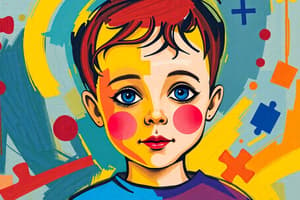Podcast
Questions and Answers
What are some common difficulties individuals with dyscalculia may experience, aside from math-related struggles?
What are some common difficulties individuals with dyscalculia may experience, aside from math-related struggles?
Memory and organization, following instructions and sequencing, and understanding abstract concepts
How can assistive technology support individuals with dyslexia?
How can assistive technology support individuals with dyslexia?
Through text-to-speech software
What are some strategies for supporting individuals with ADHD in a learning environment?
What are some strategies for supporting individuals with ADHD in a learning environment?
Breaking down tasks, providing frequent breaks, using visual aids, and teaching self-regulation skills
What is a common challenge individuals with dyslexia may face in writing and spelling?
What is a common challenge individuals with dyslexia may face in writing and spelling?
How can multisensory instruction benefit individuals with dyscalculia and dyslexia?
How can multisensory instruction benefit individuals with dyscalculia and dyslexia?
What is a key aspect of impulsivity in individuals with ADHD?
What is a key aspect of impulsivity in individuals with ADHD?
Flashcards are hidden until you start studying
Study Notes
Learning Disabilities
Dyscalculia
- A learning disability that affects an individual's ability to understand and work with numbers
- Characterized by difficulties with:
- Number sense and concept
- Math facts and calculation
- Understanding time and measurement
- Spatial awareness and visual processing
- May also experience difficulties with:
- Memory and organization
- Following instructions and sequencing
- Understanding abstract concepts
- Strategies for support:
- Multisensory instruction
- Use of visual aids and manipulatives
- Breaking down complex math problems into simpler steps
- Providing extra time to complete math tasks
Dyslexia
- A learning disability that affects an individual's ability to read and process written language
- Characterized by difficulties with:
- Phonemic awareness and phonics
- Decoding and fluency
- Comprehension and vocabulary
- Writing and spelling
- May also experience difficulties with:
- Working memory and organization
- Time management and planning
- Following instructions and sequencing
- Strategies for support:
- Multisensory instruction
- Phonics-based instruction
- Assistive technology, such as text-to-speech software
- Providing extra time to complete reading and writing tasks
Attention Deficit Hyperactivity Disorder (ADHD)
- A neurodevelopmental disorder that affects an individual's ability to regulate their attention and behavior
- Characterized by symptoms of:
- Inattention: difficulty sustaining focus, following instructions, and completing tasks
- Hyperactivity: fidgeting, restlessness, and difficulty engaging in quiet activities
- Impulsivity: impatience, interrupting, and blurting out answers
- May also experience difficulties with:
- Executive functioning: planning, organization, and time management
- Working memory and learning new information
- Social relationships and emotional regulation
- Strategies for support:
- Breaking down tasks into smaller, manageable chunks
- Providing frequent breaks and movement opportunities
- Using visual aids and reminders to stay organized
- Teaching self-regulation skills, such as mindfulness and self-monitoring
Studying That Suits You
Use AI to generate personalized quizzes and flashcards to suit your learning preferences.



